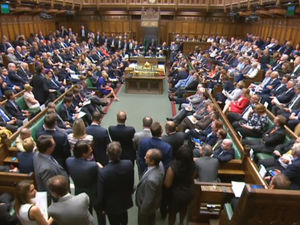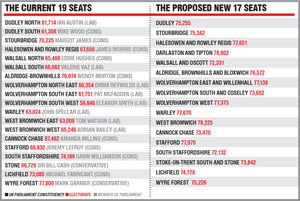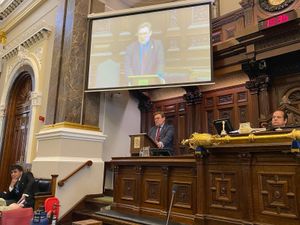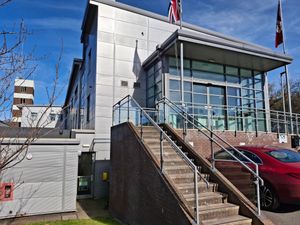ANALYSIS: All change in major boundary shake-up
The long awaited redrawing of Britain's political map has finally arrived – and it could spell huge changes across the West Midlands.

The Boundary Commission was tasked with reducing the number of MPs from 650 to 600, while at the same time making all of the constituencies around the same size.
To put it mildly, this was never going to be an easy job, particularly with Labour accusing the Tories of a land grab that some say will hand them up to 40 more seats at the next election.
When the commission first submitted its proposals at the end of last year, there were numerous complaints from MPs on all sides of the political spectrum.
Broadly, those MPs whose constituencies either stayed the same or expanded in size were in favour of the plans.
Naturally, an MP who either saw their constituency shrink, or get wiped off the political map entirely, tended to hold a very different view.

That old thorn in Theresa May's side, Boris Johnson, could see his Uxbridge and South Ruislip change dramatically, while Jeremy Corbyn's Islington North seat would also disappear.
Home Secretary Sajid Javid's Bromsgrove seat is still set to be replaced by a new Bromsgrove & Droitwich seat, although the move is unlikely to make any significant electoral impact.
In the West Midlands the changes will see an overall reduction in the number of seats of six, from 59 to 53, while the Black Country and Staffordshire will drop two constituencies down to 17 seats.
Labour MP Ian Austin's Dudley North seat will be abolished, with parts of it going into a new Dudley seat (containing parts of Dudley South) and others into the new Wolverhampton South and Coseley, the majority of which is the Wolverhampton South East seat currently held by Labour MP Pat McFadden.
Labour deputy leader Tom Watson's West Bromwich East seat will also go, with parts of it merging with the West Bromwich West seat currently held by Adrian Bailey, to form a new West Bromwich seat.
The Walsall North and South seats will disappear, with a new Walsall and Oscott ward taking in parts of both old constituencies and Birmingham’s Oscott ward.
Contentious
It is easy to see why there are so many contentious issues surrounding the proposals.
Many established MPs will face battles with colleagues over newly formed seats.
Meanwhile the Boundary Commission found that the only way to equalise the number of voters in each constituency was to cross local authority boundaries – a move that tends to be as unpopular with the public as it is with MPs.
The Government will lay the proposals before Parliament this week, prior to the House of Commons breaking up for three weeks for party conferences.
This will give MPs the chance to examine the plans, before they are voted on later this year.
Although the ink is barley dry on the documents, rumours are already circulating that the Government may try and push the vote through quickly due to the likelihood that the changes will prove unpopular with some Tories (the aforementioned Messrs Johnson and Davis, for example).
Downing Street refused to be drawn on the timing of the vote, saying only that there will be a vote in both Houses 'in due course'.
The changes will not come in until the next general election in 2022 at the earliest – and could even be pushed back beyond this date.
Gerrymandering?
The plan to cut the number of constituencies is not a new one.
It was included in the 2010 Tory general election manifesto when David Cameron presented it as a necessary cost-cutting measure at a time of austerity.
The Tories also said the changes would ensure the number of electors in each constituency is roughly equal, with current boundaries based on data which is decades old.
Under the new boundaries all constituencies will contain between 71,031 and 78,507 voters, bringing an end to the current situation where some seats have more than 90,000 electors.
The Government has said that once the changes are brought in, residents who find themselves in a new constituency will not change their address or postcode.
Labour had accused the Government of 'gerrymandering', with the changes expected to most benefit the Conservatives at the ballot box.
But the Tories have insisted the system is currently weighed against them.




